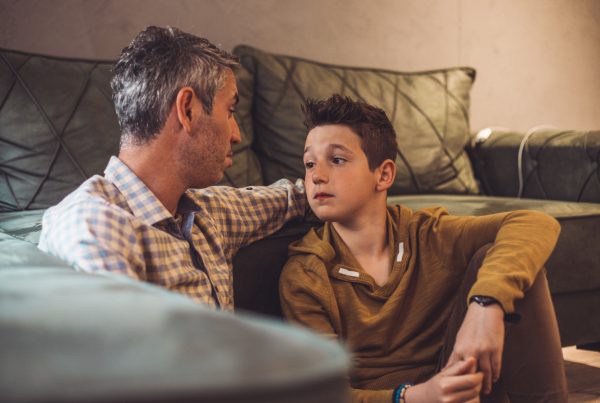Has your teen been acting strange or peculiar? Are you worried they might be depressed or struggling with some form of anxiety disorder? Has your teen’s mood shifted an awful lot lately, or are you simply worried about the changes they’ve been going through? If any of these thoughts have crossed your mind, then you may be wondering, “Does my child need a therapist?”
Unlike most adults, teens are just beginning to enter the long maturation phase of their life, which involves many twists and turns, and demands a lot of patience, especially from parents. It can be difficult sometimes to differentiate between “normal teen behavior” and something strange or worrying.
Does My Child Need a Therapist? What are the Signs?
There are still clear lines drawn between signs of potential mental health problems and healthy teen behavior. Recognizing these symptoms and reacting accordingly can help ensure that your teen gets the care they need, should they need it. Here are a few signs to keep an eye out for.
Social Interaction and Isolation
Not all teens are heavily social. In fact, people, in general, find themselves on some point across a spectrum of introversion and extroversion, where some people are more naturally inclined towards becoming social butterflies, while others prefer the company of just a friend or two.
But if your teen’s social inclinations have changed drastically and rapidly – especially if they are trending towards total isolation – your teen may be going through more than just an emotional rough patch. A common sign of severe depression or a growing anxiety disorder is preferring solitude – not just occasionally, but to an unhealthy and rapidly advancing degree.
Running Away
This is another red flag and one that is obvious to most parents. Teens do sometimes dramatically announce their intentions to run or flee in the heat of the moment, but it takes an extra push and a lot more commitment to pack that bag and run.
Running from home isn’t a dead giveaway that your teen is struggling with any particular mental health issue, of course. But it is a sign that something’s gone wrong, whether it’s the crowd they hang out with or their own perspective of how life is turning out.
Kids run away to hide, to escape, or to start fresh. Working with a therapist, even without a specific diagnosis or any other symptoms, can simply help you and your teen improve your communication skills, better convey your respective issues to one another, and prevent another runaway situation.
Severe Dietary Changes
Is your teen eating a lot more? Are they barely eating anything at all? Have they become extremely picky with the food they eat – not just making a switch to veganism, but something entirely different?
Food can be a big red flag for mental health issues – eating disorders are some of the most common and most troubling mental health problems, are associated with a host of other mental health conditions (such as severe depression), and can lead to a number of dangerous, and even fatal physical health problems.
Chronic overeating, self-induced starvation, total loss of appetite, or a sudden shift towards a harsh restriction diet should clue you in on the idea that something’s wrong, whether it’s a personal response to extreme stress (sudden loss or increase in appetite) or part of a more complex issue (such as drug use, or body dysmorphia and related self-image problems).
Death and Nihilism
A casual relationship with the concepts and aesthetics of death is nothing new for teens, but there’s a difference between an interest in the macabre and continuous, disturbing references to death – particularly one’s own death and fantasies about life (for others) after dying.
Talking about your own death, making frequent jokes or references to suicide, or thinking out loud about feeling superficial or unnecessary are common signs of suicidal ideation, a major symptom of severe depressive disorders, such as major depressive disorder or bipolar disorder.
If your teen has thought of committing suicide before, they might feel reluctant to tell you about it. If your teen’s thoughts about death are becoming more frequent and sounding more and more like thinly veiled cries for help, respond by getting help.
Signs of Self-Harm
Some forms of self-harm are more obvious than others, such as wrist cuts (made perpendicular to the bone) or burns. Others are more difficult to spot or more abstract, ranging from harmful levels of exercise to extreme risk-taking behavior, such as near-fatal thrill-seeking, drug use, deliberately unprotected sex with strangers, discontinuing their medication, and more.
Self-harm does not always mean a person is suicidal. However, they are more likely to commit suicide. Self-harm might be a form of emotional release or simply an outlet to feel some type of extreme emotion due to depression and anhedonia (lack of any joy).
Talk To Your Child
It could be argued that your teen should be the only arbiter of whether they should go to therapy.
However, the sad fact remains that most mental health issues continue to be stigmatized, which can keep people from seeking out the help they need, even when it is offered to them.
If you are struggling financially, your teen might also worry about the financial implications of seeking therapy and might refuse to get care because they would feel like a burden to the family.
Bringing the topic up with your teen might lead them to shut down or react irritably. But that’s no reason not to address your concerns. If you worry about your teen and feel that they should consider therapy, the simplest option is to talk to them about it. Perhaps they have an explanation for their behavior that you might not have realized. Perhaps their symptoms are entirely situational, and what they need is an intervention of a different kind, such as contacting the school board about extreme instances of victimization, assault, or cyberbullying.
When Talking to Your Teen Isn’t Enough
If they aren’t, or if your teen isn’t cooperating, there are other ways to seek help. Talk to your teen’s teachers and student guidance counselors, or consult a professional therapist and discuss your teen’s behavior and the potential for an intervention.
When a child gets badly hurt, our first instinct is to seek professional help – urgent care clinics, emergency rooms, and nearby medical assistance. The same should go for any crisis of mental health, as well. The mind can get hurt or sick just like the body, and there’s often no one to blame for it. Get help as soon as you can. Visions Treatment Centers is here when you’re ready.







